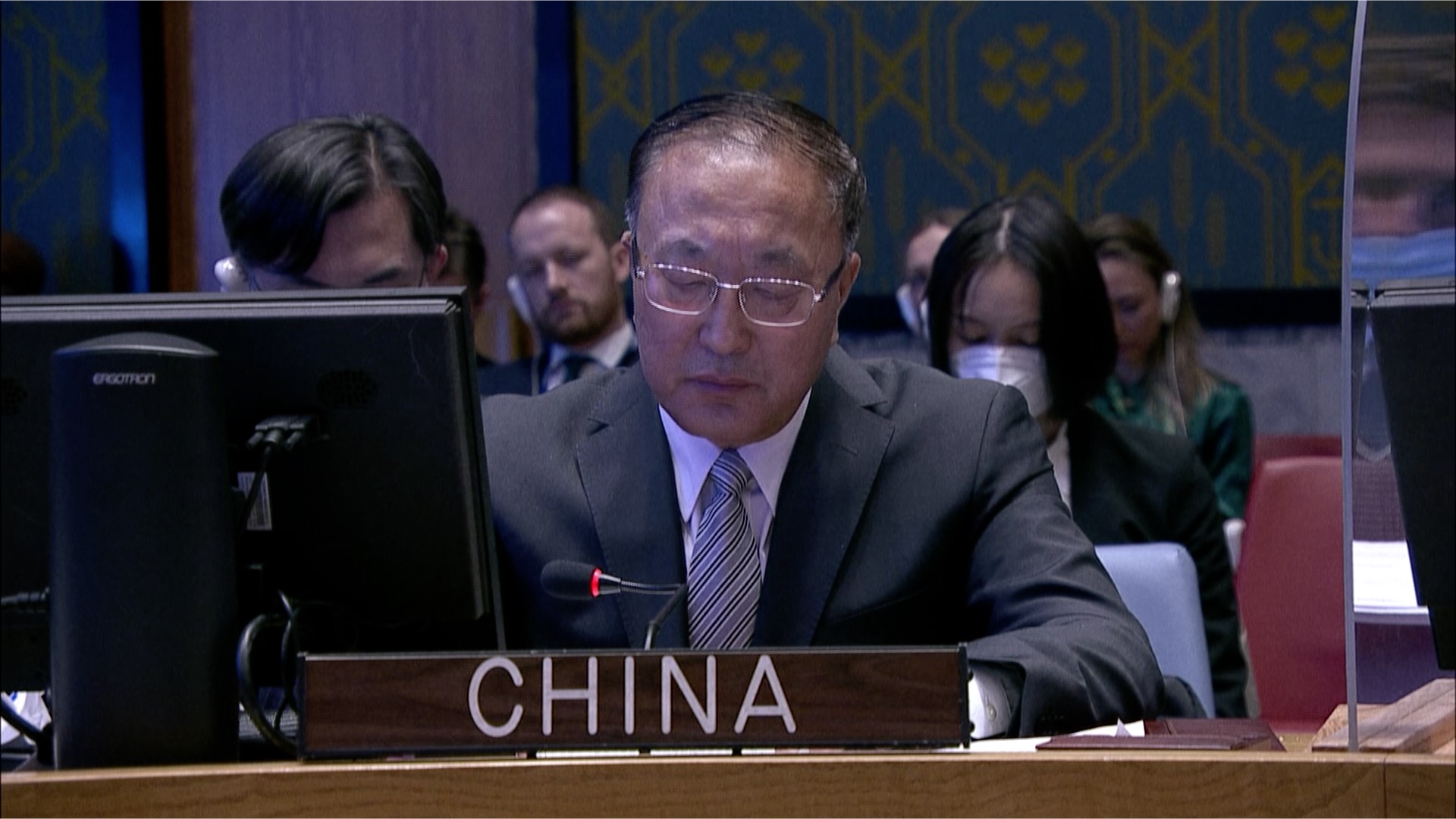China is firmly committed to de-escalating and ending the conflict in Ukraine as soon as possible, a Chinese envoy said on Tuesday.
“De-escalation and putting an early end to the conflict in Ukraine is the earnest expectation of the international community and the strong desire of China,” Zhang Jun, China’s permanent representative to the United Nations, told the UN Security Council’s briefing on Ukraine, CGTN reported.
Zhang said that the Russian Federation and Ukraine have had rounds of negotiations. China welcomes the two sides to stick to the general direction of peace negotiations, overcome difficulties and differences, and continue to build conditions for a comprehensive settlement of the crisis, he stressed.
“The international community should create favorable conditions and environment for negotiations between the two sides, open up space for political settlement, and should not set up obstacles for peace, let alone add fuel to the fire in aggravation of confrontations,” Zhang said.
Speaking of the humanitarian issue, Zhang said that China attaches great importance to this issue in Ukraine and supports all initiatives and measures conducive to alleviating the humanitarian crisis in Ukraine.
“We call on the parties to abide by international humanitarian law, protect the safety of civilians and civilian facilities, minimize civilian casualties, ensure safe and smooth humanitarian corridors for evacuees and humanitarian assistance, and guarantee the basic rights of women, children, and wounded and detained fighters,” he said.
Zhang Jun stressed that civilians should be spared of any forms of violence in armed conflicts.
“Attacks against civilians are unacceptable and should not occur,” he said, noting that “the reports and images of civilian deaths in Bucha are deeply disturbing”.
“The relevant circumstances and specific causes of the incident should be verified and established. Any accusations should be based on facts. Before the full picture is clear, all sides should exercise restraint and avoid unfounded accusations,” he stressed.
Referring to sanctions imposed, the ambassador said that “sanctions are not an effective means to solve the problem, but will instead accelerate the spillover of the crisis, and bring new and complex problems”.
“The implementation of all-dimensional and indiscriminate sanctions is tantamount to politicizing, instrumentalizing and weaponizing the world economy, triggering a serious crisis in the fields of global economy and trade, finance, energy, food, industrial chain, and supply chain,” he said.
Chinese Foreign Ministry Spokesperson Zhao Lijian also said at a briefing on Wednesday all accusations related to the situation in the Ukrainian town of Bucha should be based on real facts.
“Any accusations should be based on real facts. There is a need to exercise restraint until an investigation is conducted,” he pointed out.
According to the diplomat, China supports initiatives that facilitate efforts to improve the humanitarian situation in Ukraine.
“China is taking real steps in this direction,” he noted.
Zhao also emphasized the need to figure out “what really happened and the reasons behind it.”
India’s Ambassador to the UN, T. S. Tirumurti also said there should be an independent investigation into the events in the Ukrainian city of Bucha in the Kiev region, after the Ukrainian government accused Russian troops of killing civilians there. The diplomat called the reports of civilian killings in the city “disturbing”, Sputnik reported.
T. S. Tirumurti also called for an immediate cessation of hostilities and stressed the need to deal with Ukraine’s humanitarian needs.
Kiev previously accused Russian troops of killings hundreds in Bucha distributing photos of bodies of alleged victims lying on the city’s streets in the Western media. Russian Defence Ministry rejected the accusations and stated that the photos and videos had been staged pointing at the fact that the footage emerged only four days after Russian troops’ withdrawal from the city.
The Kremlin condemned Kiev’s “provocation in Bucha” arguing that it complicates negotiations between the two countries aimed at ending the Russian special military operation that was launched on February 24. Russia’s Foreign Minister Sergei Lavrov alleged that the whole point of the provocation was to thwart the talks process, which started showing results during the last round of in-person talks.
According to a report, Apart from deploring the civilian deaths in Bucha, China’s remarks at the UN followed two familiar themes—reprimanding the West for destabilizing the post-Cold War security environment in Europe, and opposing its sweeping sanctions against Russia.
Ambassador Zhang called the war in Ukraine “a geopolitical tragedy” that merited some reflection. “The sovereignty and territorial integrity of all countries should be respected. Small- and medium-sized countries should not be pushed to the forefront of confrontation between great powers.”
“All countries have the right to decide their foreign policy independently, and should not be forced to take sides,” said Zhang, before calling on the U.S., NATO and the European Union to negotiate with Russia—apparently without Ukraine—in order to resolve “differences accumulated over the years” and build a “sustainable regional security framework” to guarantee peace.
Without naming specific Western governments, Zhang likened the imposition of “indiscriminate sanctions” to “weaponizing the world economy.” He warned of energy and food shortages as well as further supply chain disruptions.
“The vast number of developing countries are not parties to the conflict, and should not be involved in this confrontation, let alone be forced to bear the consequences of geopolitical conflicts and great power competition,” he said, suggesting unfavorable spillover effects that would impact China, too.
On Wednesday, the morning after Zhang gave his remarks at the UN, the Chinese Communist Party’s central newspaper, the People’s Daily, published a column decrying America’s “economic hegemony and financial terrorism” through sanctions.
It was the sixth installment in a series by “Zhong Sheng,” the Chinese leadership’s pen name when writing on international affairs. Since March 29, each page 3 column has framed the war in Ukraine as a result of U.S. hegemony.













